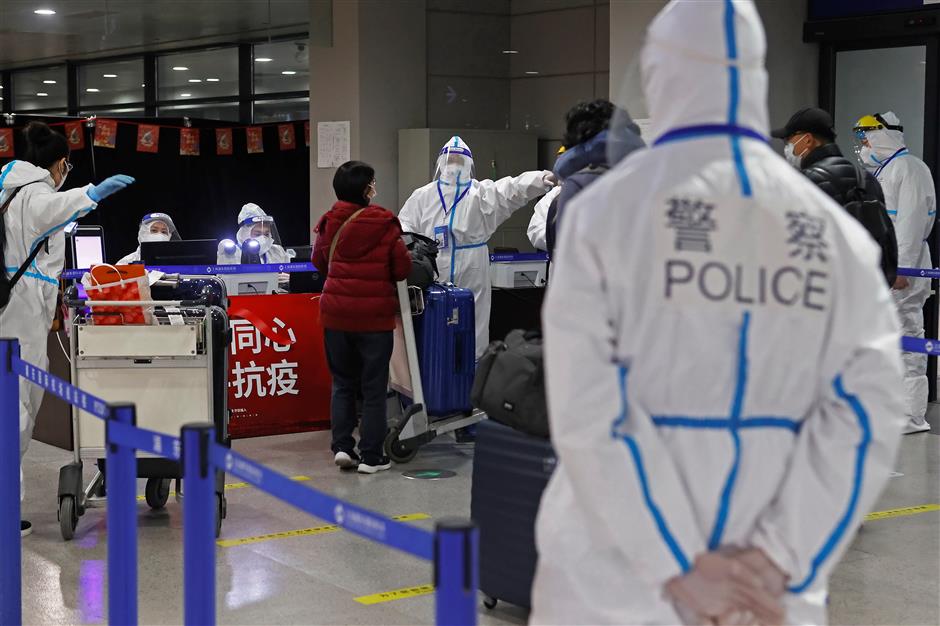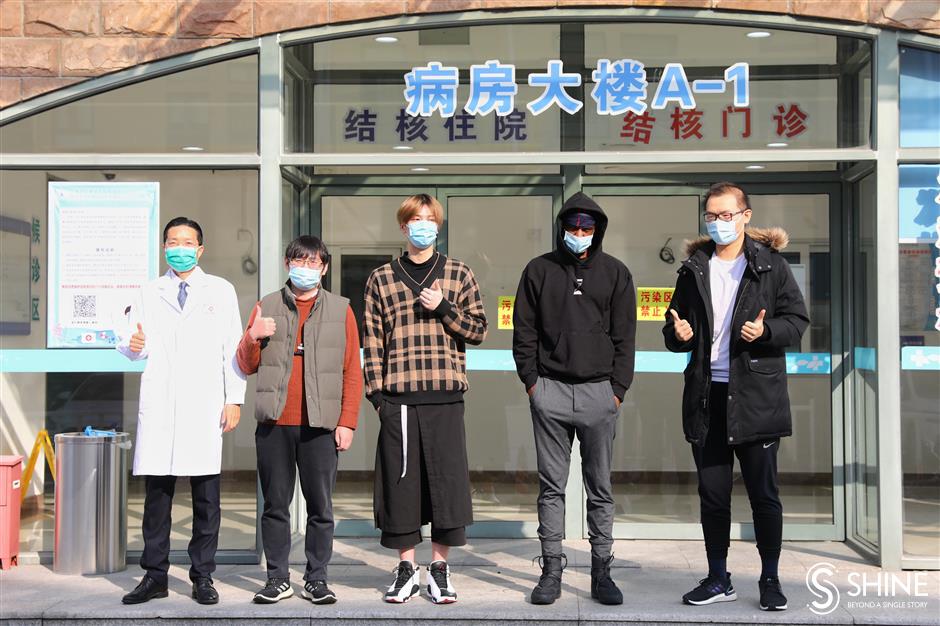
All passengers from abroad are subject to a "close-loop" management procedure at Shanghai Pudong International Airport.
With the pandemic reaching the "peak risky period" globally, a record number of imported COVID-19 infection cases are being treated in Shanghai, the city's top coronavirus expert said.
The coronavirus wards of the Shanghai Public Health Clinical Center, the city's major hospital for COVID-19 treatment, has received the largest number of patients from overseas since the pandemic began some two years ago.
"Shanghai is facing great pressure from the surging imported cases, as the world has entered the extremely high risky period of the COVID-19 pandemic," said Dr Zhang Wenhong, head of Shanghai's COVID-19 treatment team and director of the National Center for Infectious Diseases.
"China must maintain its strategic focus and patience as well as public health prevention measures while administering booster shots to get through this most difficult period," Zhang said on his Weibo microblog.
As a key air hub and gateway of China, Shanghai's Pudong International Airport handles about a third of the country's inbound and outbound overseas flights.
Amid a new wave in the global pandemic caused by the Omicron variant, which is more transmissible than the previously dominant Delta variant, Shanghai has reported 300-plus imported cases since January 1, or some 25 cases a day on average, according to data from the Shanghai Health Commission.
Most flights from the United States to Shanghai have been suspended by China's civil aviation regulator following the rising number of imported COVID-19 cases.
So far, of all the 3,015 imported cases, 2,654 have been discharged upon recovery while the remaining 361 are still hospitalized, mainly at the clinical center.
"Compared to the Delta variant, Omicron is spreading faster and is more hidden. As such its damage cannot be ignored," said Zhang.
 Jiang Xiaowei / SHINE
Jiang Xiaowei / SHINERecovered patients from overseas are discharged from the Shanghai Public Health Clinical Center.
Anti-COVID-19 drug
Preparations have begun for clinical studies on China's new domestically developed anti-COVID-19 drug, which, along with the booster shot, will become the core scientific support to get through the pandemic, noted Zhang.
The anti-COVID-19 forces across the country, meanwhile, are standing by for any emergency. Once a local case emerges, the team spares no effort to contain the spread of the virus overnight and avoid disturbing citizens' normal life, he added.
All overseas travelers to Shanghai are subject to 14 days of central quarantine and another week of self-health monitoring period.
Zhang revealed that one of the recent imported cases tested positive on Tuesday, the last day of his self-health monitoring period, so it is essential to strictly follow the protocols during this phase.
Authorities reiterated that during the self-health monitoring period, people are not allowed to take public transport, gather for meals or dine in restaurants, and participate in activities such as watching movies, exhibitions or meetings. Visits to indoor places such as cinemas, supermarkets, offices or KTV are also not permitted.
Zhang also shared the latest prevention notice by the World Health Organization against the Omicron variant with his more than 4 million followers on the microblog.
A record 15 million new COVID-19 infections were reported across the globe in a single week as Omicron rapidly replaces Delta as the dominant variant across the globe, according to the WHO.
The WHO – the United Nations' health agency – said the number of global cases has increased by 71 percent in the last week. More community transmission means more hospitalizations and greater pressure on the medical system, especially on countries with limited medical resources, Zhang pointed out.
Though vaccines cannot fully prevent the transmission of Omicron compared to other variants, a booster shot of the same or different vaccines remains effective in preventing death and severe conditions, he claimed.
People without vaccination, the elderly, weak and those with low immunity are most likely to suffer severe COVID-19 conditions amid the pandemic, while most fully-vaccinated young people can come through safely, the expert suggested.
"It is the toughest period for human beings in the fight against the Omicron variant," said Zhang.
 Wang Rongjiang / SHINE
Wang Rongjiang / SHINELocal residents receive COVID-19 vaccines at a makeshift site in Xujiahui commercial hub in Shanghai early this month.
